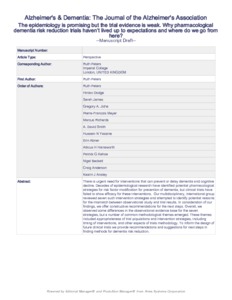Peters, R;
Dodge, H;
James, S;
Jicha, GA;
Meyer, P-F;
Richards, M;
Smith, AD;
Yassine, HN;
Abner, E;
Hainsworth, AH;
et al.
Peters, R; Dodge, H; James, S; Jicha, GA; Meyer, P-F; Richards, M; Smith, AD; Yassine, HN; Abner, E; Hainsworth, AH; Kehoe, PG; Beckett, N; Anderson, C; Anstey, KJ
(2022)
The epidemiology is promising, but the trial evidence is weak. Why pharmacological dementia risk reduction trials haven't lived up to expectations, and where do we go from here?
Alzheimers & Dementia, 18 (3).
pp. 507-512.
ISSN 1552-5260
https://doi.org/10.1002/alz.12393
SGUL Authors: Hainsworth, Atticus Henry
![[img]](https://openaccess.sgul.ac.uk/113273/6.hassmallThumbnailVersion/ADJ-S-20-00733.pdf)  Preview |
|
PDF
Accepted Version
Available under License ["licenses_description_publisher" not defined].
Download (1MB)
| Preview
|
Abstract
There is an urgent need for interventions that can prevent or delay cognitive decline and dementia. Decades of epidemiological research have identified potential pharmacological strategies for risk factor modification to prevent these serious conditions, but clinical trials have failed to confirm the potential efficacy for such interventions. Our multidisciplinary international group reviewed seven high-potential intervention strategies in an attempt to identify potential reasons for the mismatch between the observational and trial results. In considering our findings, we offer constructive recommendations for the next steps. Overall, we observed some differences in the observational evidence base for the seven strategies, but several common methodological themes that emerged. These themes included the appropriateness of trial populations and intervention strategies, including the timing of interventions and other aspects of trials methodology. To inform the design of future clinical trials, we provide recommendations for the next steps in finding strategies for effective dementia risk reduction.
| Item Type: |
Article
|
| Additional Information: |
This is the peer reviewed version of the following article: Peters, R, Dodge, HH, James, S, et al. The epidemiology is promising, but the trial evidence is weak. Why pharmacological dementia risk reduction trials haven't lived up to expectations, and where do we go from here? Alzheimer's Dement. 2022; 18: 507– 512, which has been published in final form at https://doi.org/10.1002/alz.12393. This article may be used for non-commercial purposes in accordance with Wiley Terms and Conditions for Use of Self-Archived Versions. This article may not be enhanced, enriched or otherwise transformed into a derivative work, without express permission from Wiley or by statutory rights under applicable legislation. Copyright notices must not be removed, obscured or modified. The article must be linked to Wiley’s version of record on Wiley Online Library and any embedding, framing or otherwise making available the article or pages thereof by third parties from platforms, services and websites other than Wiley Online Library must be prohibited. |
| Keywords: |
Geriatrics, 1109 Neurosciences, 1103 Clinical Sciences |
| SGUL Research Institute / Research Centre: |
Academic Structure > Molecular and Clinical Sciences Research Institute (MCS) |
| Journal or Publication Title: |
Alzheimers & Dementia |
| ISSN: |
1552-5260 |
| Publisher License: |
Publisher's own licence |
| Projects: |
|
| URI: |
https://openaccess.sgul.ac.uk/id/eprint/113273 |
| Publisher's version: |
https://doi.org/10.1002/alz.12393 |
Statistics
Item downloaded times since 24 May 2021.
Actions (login required)
 |
Edit Item |


